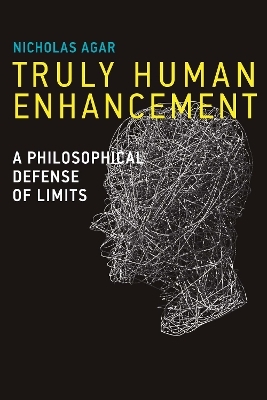
Truly Human Enhancement
A Philosophical Defense of Limits
Seiten
2013
MIT Press (Verlag)
978-0-262-02663-5 (ISBN)
MIT Press (Verlag)
978-0-262-02663-5 (ISBN)
- Titel ist leider vergriffen;
keine Neuauflage - Artikel merken
A nuanced discussion of human enhancement that argues for enhancement that does not significantly exceed what is currently possible for human beings.
The transformative potential of genetic and cybernetic technologies to enhance human capabilities is most often either rejected on moral and prudential grounds or hailed as the future salvation of humanity. In this book, Nicholas Agar offers a more nuanced view, making a case for moderate human enhancement-improvements to attributes and abilities that do not significantly exceed what is currently possible for human beings. He argues against radical human enhancement, or improvements that greatly exceed current human capabilities.
Agar explores notions of transformative change and motives for human enhancement; distinguishes between the instrumental and intrinsic value of enhancements; argues that too much enhancement undermines human identity; considers the possibility of cognitively enhanced scientists; and argues against radical life extension. Making the case for moderate enhancement, Agar argues that many objections to enhancement are better understood as directed at the degree of enhancement rather than enhancement itself. Moderate human enhancement meets the requirement of truly human enhancement. By radically enhancing human cognitive capabilities, by contrast, we may inadvertently create beings ("post-persons") with moral status higher than that of persons. If we create beings more entitled to benefits and protections against harms than persons, Agar writes, this will be bad news for the unenhanced. Moderate human enhancement offers a more appealing vision of the future and of our relationship to technology.
The transformative potential of genetic and cybernetic technologies to enhance human capabilities is most often either rejected on moral and prudential grounds or hailed as the future salvation of humanity. In this book, Nicholas Agar offers a more nuanced view, making a case for moderate human enhancement-improvements to attributes and abilities that do not significantly exceed what is currently possible for human beings. He argues against radical human enhancement, or improvements that greatly exceed current human capabilities.
Agar explores notions of transformative change and motives for human enhancement; distinguishes between the instrumental and intrinsic value of enhancements; argues that too much enhancement undermines human identity; considers the possibility of cognitively enhanced scientists; and argues against radical life extension. Making the case for moderate enhancement, Agar argues that many objections to enhancement are better understood as directed at the degree of enhancement rather than enhancement itself. Moderate human enhancement meets the requirement of truly human enhancement. By radically enhancing human cognitive capabilities, by contrast, we may inadvertently create beings ("post-persons") with moral status higher than that of persons. If we create beings more entitled to benefits and protections against harms than persons, Agar writes, this will be bad news for the unenhanced. Moderate human enhancement offers a more appealing vision of the future and of our relationship to technology.
Nicholas Agar is Professor of Ethics at Victoria University of Wellington, New Zealand. He is the author of Humanity's End: Why We Should Reject Radical Enhancement and Truly Human Enhancement: A Philosophical Defense of Limits, both published by the MIT Press.
| Reihe/Serie | Basic Bioethics |
|---|---|
| Zusatzinfo | 4 figures; 4 Illustrations |
| Verlagsort | Cambridge, Mass. |
| Sprache | englisch |
| Maße | 152 x 229 mm |
| Gewicht | 426 g |
| Themenwelt | Geisteswissenschaften ► Philosophie ► Ethik |
| Medizin / Pharmazie ► Medizinische Fachgebiete ► Medizinethik | |
| Studium ► Querschnittsbereiche ► Geschichte / Ethik der Medizin | |
| Naturwissenschaften ► Biologie | |
| Naturwissenschaften ► Geowissenschaften ► Geografie / Kartografie | |
| ISBN-10 | 0-262-02663-5 / 0262026635 |
| ISBN-13 | 978-0-262-02663-5 / 9780262026635 |
| Zustand | Neuware |
| Haben Sie eine Frage zum Produkt? |
Mehr entdecken
aus dem Bereich
aus dem Bereich
Die Geschichte eines Weltzentrums der Medizin von 1710 bis zur …
Buch | Softcover (2021)
Lehmanns Media (Verlag)
17,95 €
von der Antike bis zur Gegenwart
Buch | Softcover (2024)
C.H.Beck (Verlag)
12,00 €
Krankheitslehren, Irrwege, Behandlungsformen
Buch | Softcover (2024)
C.H.Beck (Verlag)
39,95 €


